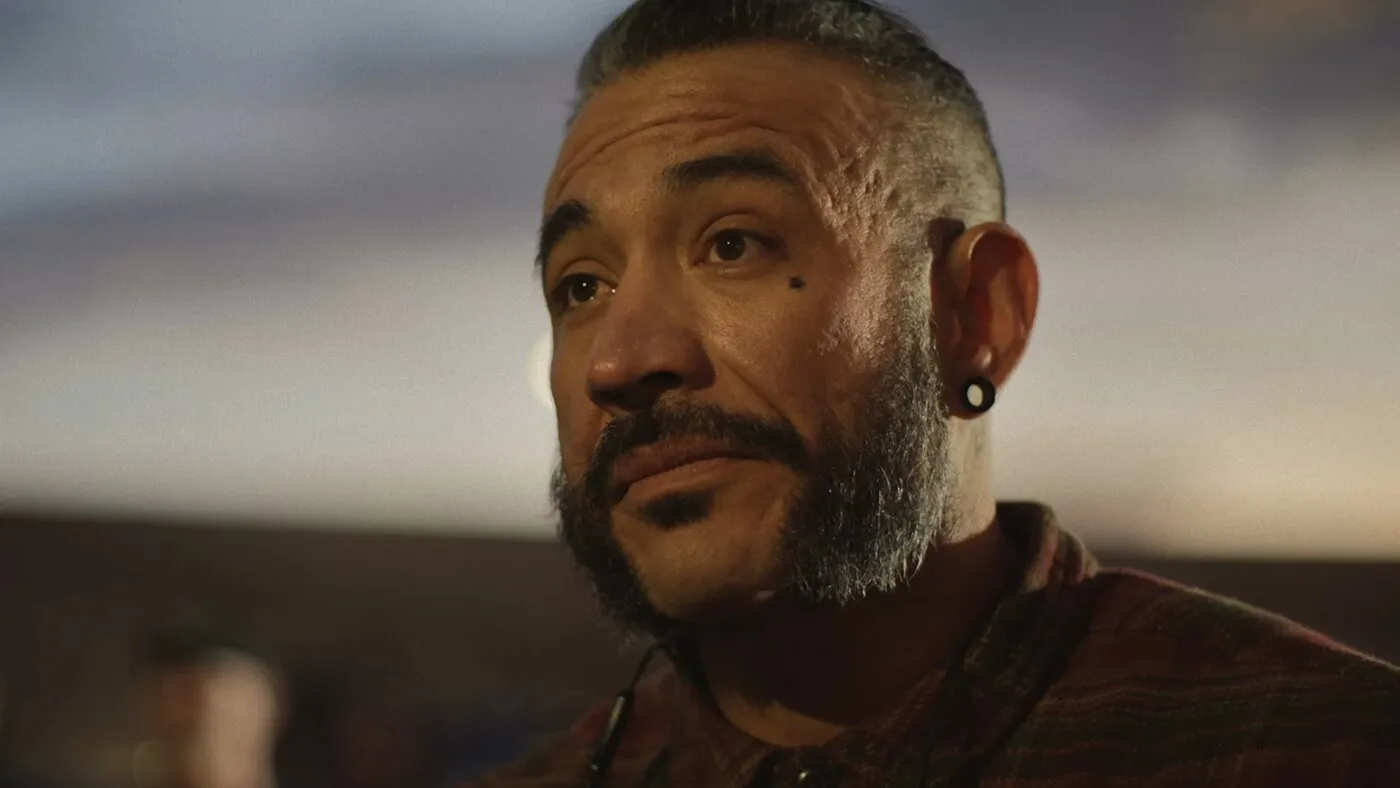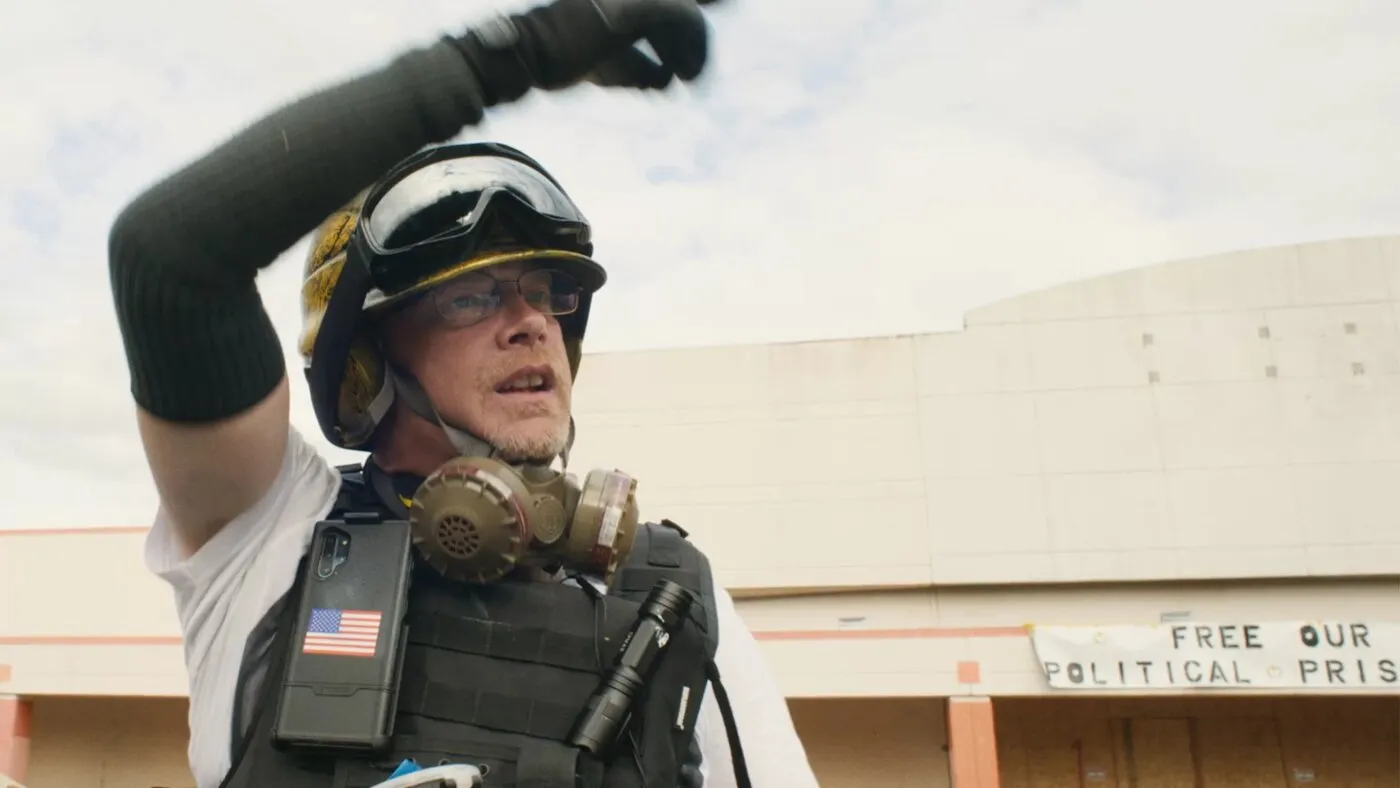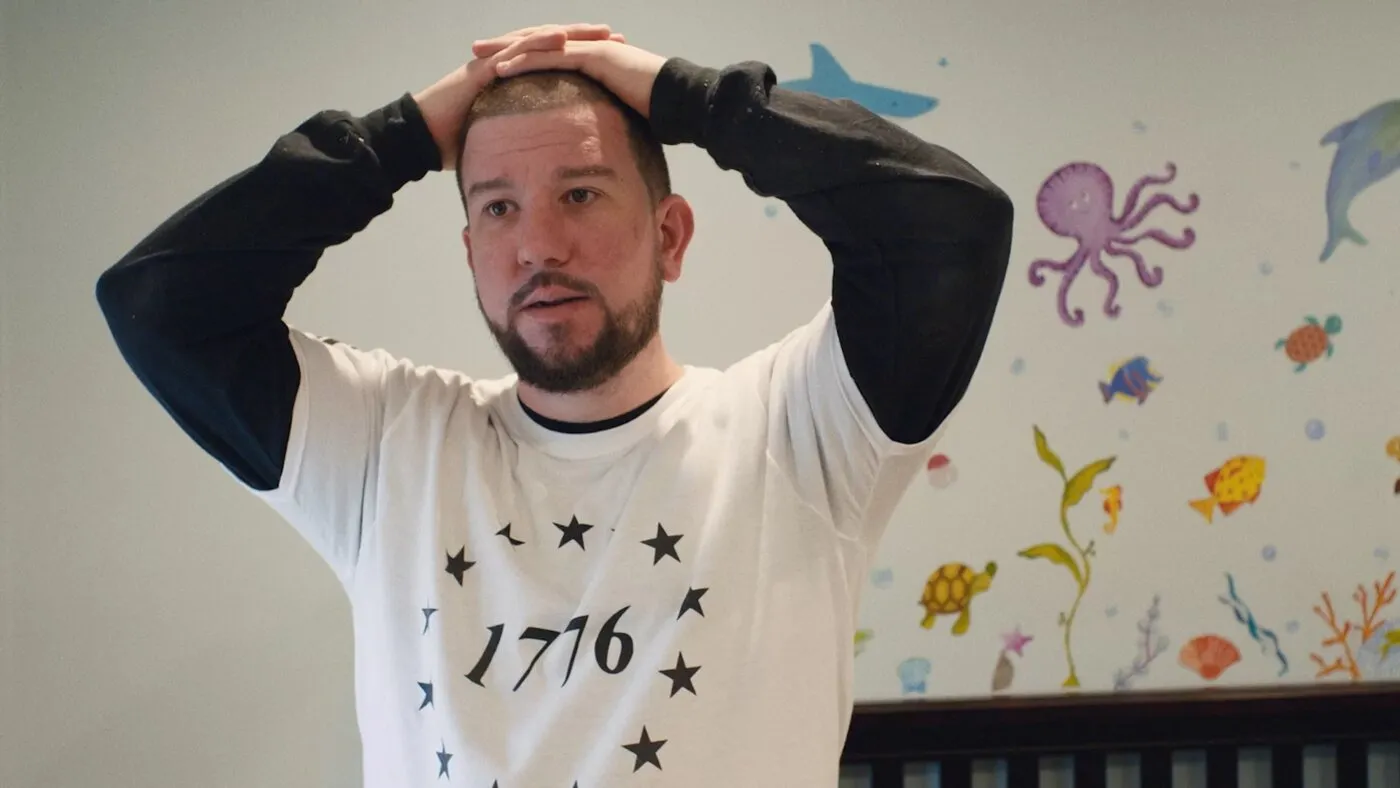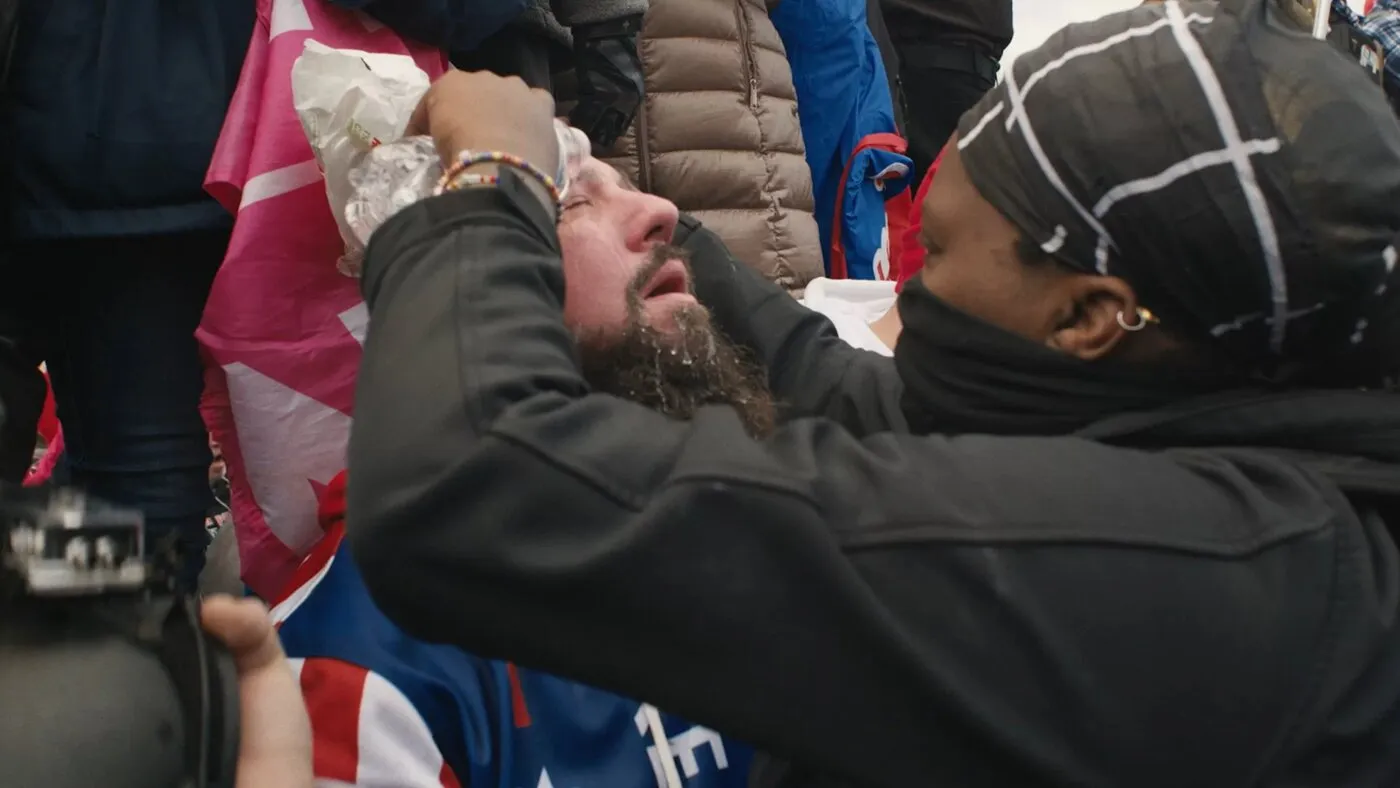The months leading up to the 2020 election saw political divides deepen into chasms in America. With COVID raging and the economy struggling, many felt unheard. Others saw progress they couldn’t accept. It was a Tinderbox, and it only took a spark.
That spark came on January 6th, when rioters stormed the Capitol building in a shocking display. Viewers were left asking how such a seemingly outlier event could happen in the first place. Michael Premo’s unflinching documentary Homegrown moves beyond the headlines to offer deeper context. He intimately profiles three activists in the run-up to these tumultuous times, giving audiences unprecedented access to their daily lives and increasingly radicalized minds.
We meet Randy, a veteran disillusioned with changing social mores. Chris, a new father anxious about a changing world. And Thad, a charismatic figure who tries bridging divides but can’t escape his own biases. Through fly-on-the-wall footage, their passions, contradictions, and gradual radicalization are laid bare. As election tensions mount and conspiracy theories spread, Premo is there to document it all—including following Chris literally onto the front lines of the Capitol siege.
In profiling these ordinary men who end up committing extraordinary acts, Homegrown provides a sobering portrait of rising extremism. It explores how otherwise average individuals can become radicalized and holds an unflinching mirror to societal fissures that turned deadly when pushed beyond breaking point. Though challenging, it is an intimate examination well worth viewing to better understand how danger can fester within the daily.
Inner Turmoil
Each of the film’s subjects came to extremism through a different door. We see glimpses of what drew them in and what festered beneath the surface.
Randy proudly served his country but returned disillusioned by social changes. Without purpose in peace, he sought meaning in division. The film hints at past tragedy, intensifying his bitter worldview.
Of the three, Chris’ rage grows most vividly. As a proud new dad, he should be focused on family. But fears for his son’s future twisted into frenzied attempts to undo the election. His conflicting views are complex; he claims not to be bigoted despite espousing extreme, sometimes violent ideas. As election tensions mount, so does his inability to separate rhetoric from reality.
Then there’s Thad, whose contradictions make him endlessly fascinating. The charming Texan fancies himself a bridge builder, befriending a Black Lives Matter leader. But closeness only highlights his closed mind. When different factions meet, the mismatch hints how superficial Thad’s desire to reconcile truly was.
Through nuanced portraits, the film illuminates turbulent forces many cannot see in ourselves. In showing not just outward actions but inner turmoil, it offers empathy even as it holds up an unflinching mirror. These profiles give texture to an issue often reduced to caricatures, reminding us that extremism can blossom from seeds planted within the ordinary, wherever hope and understanding diminish.
An Unflinching Gaze
Director Michael Premo takes an unorthodox approach with Homegrown, simply observing his subjects without judgments or critiques. He doesn’t shy away from their misguided views either, content to let their own words speak volumes.
Through an almost fly-on-the-wall style, Premo immerses us deep in these men’s worlds. We’re there as tensions rise in the lead-up to January 6th. Present but never intrusive, his camera captures their activism and private moments alike with candid intimacy.
It’s a technique that proves powerfully effective. With no narrator to shape opinions, we see these individuals in full, nuanced context. Space opens to reveal inner workings left unsaid to a confrontational interviewer.
Subtle details that may elsewhere seem ordinary pop with new insight. We notice lingering looks, half-spoken fears, and shifting alliances within their fragmented social circles.
Most striking is how this casual style heightens the discomfort of their misplaced certitude and ignorance on open display. Premo need not editorialize—their own prejudices emerge stark and unvarnished from moments meant as casual.
It’s a sobering, sometimes disturbing approach. But it’s also deeply humanizing. By issuing no rebuttals, Premo instead lets contradictions speak for themselves. We see angry division alongside private graces in a way that recognizes our shared fallibility.
In peeling back layers with calm control, Premo offers us an unflinching mirror seldom found in such divisive issues. It’s a powerful reminder that empathy comes not from answers but from questions.
Building to a Boil
As Election Day drew closer, tensions mounted both within the film’s subjects and across the country. Foreshadowing clashes to come, we watch the men’s rhetoric escalate alongside unrest on the streets.
Randy assists at more rallies, switching between attempts at calm debates and flashes of fury when challenges arise. Thad takes his multicultural message from friendly chats to fraught meetups that expose festering divides. And Chris increasingly fixates on grand plans, certain their side alone sees truth.
Come November, their refusal to accept defeat mirrors Trump’s own. When results confirm Biden, these “patriots” can’t tolerate what they’ve deemed a “stolen” outcome. We see them openly debating confrontation, derailed only by pleas from worried loved ones.
As inauguration approaches, the boiling point looms near. Rallying in D.C., their passion morphs to palpable peril. Scuffles with counterprotesters intensify, yet removing oneself from escalating tensions seems impossible for these ideologues at each other’s throats.
It’s a tense build that makes the shocking culmination of violence on Capitol Hill difficult to watch, yet impossible to look away from. In documenting radicalization’s unnoticed rise, Premo crafts a masterclass of suspense that’s equally chilling as the unrest it portends. His alarming portrait proves how easily outrage can override reason, and a nation breaks at the seams.
Storming the Citadel
As Election Day faded into a new year, tensions came to a head. On January 6th, Premo’s camera follows the footsteps of one subject straight into the fray.
We’ve watched Chris spiral for months, fixating on stopping what he insists is a “stolen” election. Now, as crowds amass in Washington, the film places us by his side amid the chaos.
From this intimate vantage, the mayhem of that day hits differently. Camera jostled by the crush, we see unrest swell in real-time. Fists and flagpoles fly as the mob clashes with outnumbered guardians of the Capitol steps.
Having followed Chris’ journey, glimpses of his face in the melee are haunting. News reports showed unrest from a distance—here the riots feel disturbingly close. We witness the frenzy firsthand, helpless but to absorb every shove and shout.
Most chilling is understanding Chris’ rage drove him here. An ordinary man succumbed to extremism, lost in delusions that led straight to insurrection. As violence overwhelms the citadel, it’s sobering how easily democracy can fall.
Premo grants no respite, keeping the camera rolling even as danger mounts. It makes re-living that day’s distress a complicated watch, but a duty to bear witness to the reality of radicalization wrought upon the republic.
Bitter Brews and Barbed Vines
Premo offers no analysis throughout Homegrown, yet the themes his subjects unveil speak volumes. Their dialogue and actions allow troubling patterns to emerge of their own accord.
We witness the eerie progression of once-ordinary men radicalized by amplified anxieties. Fears not rooted in reality take hold; distrust for differing views spreads deep tendrils. As misinformation runs rampant and division serves political ends, their perceptions mutate into perverse certainties.
Delusions take the place of nuanced discussion as anger rises to fill lack of purpose. Personal grievances morph into grand crusades to restore a past that likely never was. The notion of addressing root issues gives way to assigning blame outwardly while staying blind to faults within.
Premo makes clear how easily extremism can cultivate in conditions where empathy withers. When cooperation falters and understanding dims, manufactured panics find fertile soil. His subjects showcase how a toxic blend of these ills transformed them from citizens to insurrectionists.
In abstaining from excuses, the film issues no absolution. But in profiling lives pulled towards delusion’s edge by embers of wider societal disconnect, it underscores culture’s role in brewing bitter divides. This unsensationalized mirror reflects hard truths about humanity’s collective fallibility and the vigilance required against radicalization’s spread.
Behind Radicalization’s Mask
As the credits roll, Homegrown’s impact lingers. Through candid access, Premo has illuminated radicalization in a way that merits reflection long after the final frame.
By profiling these ordinary men led down extremism’s path, the film offers remarkable insight into how easily intolerance can fester beneath the surface and erupt with alarming force. It reminds me that demagoguery finds footing wherever community bonds weaken and empathy erodes.
Premo pulls back radicalization’s mask to reveal troubled souls, not comic book villains. But in humanizing extremism’s face, he issues no absolution. There are no excuses made for attacks that shook democracy.
Even as investigations continue bridging understanding around January 6th’s insurrection, Homegrown’s lessons retain importance. In watching radical views bloom daily before climax, viewers absorb a masterclass in the vigilance society requires against such divisions.
It’s a sobering documentary that lingers in thoughtful minds. In probing humanity’s capacity for good and ill, Premo crafts a work both disturbing and deeply meaningful for its unvarnished mirror held to fracturing societies from within. With clarity and care, it marks a call to repair what has torn asunder and prevent history from repeating its gravest errors.
The Review
Homegrown
Homegrown is an invaluable work of non-fiction cinema. Director Michael Premo handles extremism's complex issues with empathy, care, and intelligence throughout. He sheds light on political radicalization's root causes with depth rarely achieved.
PROS
- Intimate, fly-on-the-wall perspective into lives of radicalized individuals
- Empathetic yet unflinching examination of extremism's causes and effects
- Shapes nuanced understanding of political polarization's human realities
- Expertly crafted filmmaking that engages audiences on complex issues
- Provokes thoughtful reflection on societal divides and their consequences
CONS
- Challenging subject matter may push some audiences outside their comfort zone.
- Does not provide definitive "answers" for complicated problems around radicalization.
- Relies on passive observation over interviews that could add context
- Some may find the portrayal of extremists too sympathetic.


















































